-
 Bitcoin
Bitcoin $79,012.1761
-4.78% -
 Ethereum
Ethereum $1,570.4026
-12.09% -
 Tether USDt
Tether USDt $0.9994
-0.02% -
 XRP
XRP $1.9666
-7.46% -
 BNB
BNB $555.4328
-6.02% -
 USDC
USDC $0.9999
-0.01% -
 Solana
Solana $107.5201
-9.67% -
 Dogecoin
Dogecoin $0.1506
-10.27% -
 TRON
TRON $0.2315
-2.62% -
 Cardano
Cardano $0.5814
-10.27% -
 UNUS SED LEO
UNUS SED LEO $8.8602
-2.17% -
 Chainlink
Chainlink $11.3795
-10.04% -
 Toncoin
Toncoin $3.0063
-7.92% -
 Stellar
Stellar $0.2370
-5.38% -
 Avalanche
Avalanche $16.1395
-9.48% -
 Shiba Inu
Shiba Inu $0.0...01134
-7.55% -
 Sui
Sui $1.9135
-13.06% -
 Hedera
Hedera $0.1425
-11.59% -
 Polkadot
Polkadot $3.7145
-5.76% -
 MANTRA
MANTRA $5.9824
-4.31% -
 Bitcoin Cash
Bitcoin Cash $272.1059
-9.40% -
 Litecoin
Litecoin $71.2279
-13.11% -
 Dai
Dai $1.0000
-0.02% -
 Ethena USDe
Ethena USDe $0.9987
-0.05% -
 Bitget Token
Bitget Token $4.1866
-5.67% -
 Pi
Pi $0.5915
4.23% -
 Monero
Monero $200.3568
-5.71% -
 Hyperliquid
Hyperliquid $10.5427
-10.74% -
 Uniswap
Uniswap $5.1188
-11.73% -
 OKB
OKB $50.3711
-2.37%
How is NFT Virtual Real Estate traded in the metaverse?
Metaverse NFT real estate trading, mirroring traditional property sales, uses blockchain for ownership verification via NFTs, typically transacted with cryptocurrencies like Ethereum on platforms like Decentraland. Legal and jurisdictional issues remain a developing concern.
Mar 03, 2025 at 08:36 pm
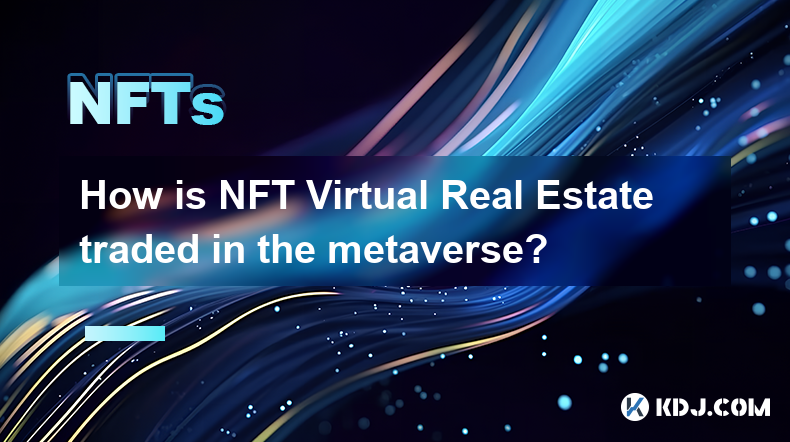
Key Points:
- NFT virtual real estate trading in the metaverse operates similarly to traditional real estate, but utilizes blockchain technology and NFTs for ownership verification.
- Transactions occur on various metaverse platforms and marketplaces, each with its own set of rules and fees.
- Payment methods typically involve cryptocurrencies, with Ethereum being a prevalent choice.
- Understanding the platform's policies, assessing land value, and verifying ownership are crucial aspects of successful trading.
- Legal considerations, particularly regarding jurisdiction and intellectual property, are emerging challenges in this rapidly evolving space.
How is NFT Virtual Real Estate Traded in the Metaverse?
The metaverse, a persistent, shared, 3D virtual world, has seen a surge in interest in virtual real estate represented by NFTs (Non-Fungible Tokens). These NFTs act as proof of ownership for digital land parcels, buildings, or even specific locations within various metaverse platforms. Trading this virtual real estate mirrors traditional property transactions, but with a crucial difference: the entire process is recorded and verified on a blockchain.
Unlike traditional real estate, where deeds are physical documents, NFT virtual real estate ownership is immutably recorded on the blockchain. This transparency adds a layer of security and verifiability not found in the traditional market. However, the lack of established legal frameworks presents unique challenges.
The process of buying and selling NFT virtual real estate typically begins with identifying a suitable platform. Popular metaverses such as Decentraland and The Sandbox offer virtual land for sale. Each platform has its own marketplace or integrated trading system. These marketplaces function similarly to online real estate portals, allowing users to browse available properties, view details, and make offers.
Payment for virtual land is usually conducted using cryptocurrencies, predominantly Ethereum. This aligns with the decentralized nature of the metaverse and the blockchain technology underpinning NFTs. However, some platforms may accept other cryptocurrencies or even fiat currencies, depending on their specific setup.
Before purchasing, thorough due diligence is paramount. Factors influencing the value of virtual real estate include location (proximity to popular areas or landmarks), size, and potential for development. Just like in the physical world, prime locations command higher prices. It's also vital to understand the specific terms and conditions of the platform, including any limitations on development or usage rights.
The actual trading process often involves connecting a cryptocurrency wallet to the chosen marketplace. Once a property is selected, the buyer initiates a transaction, sending the agreed-upon cryptocurrency amount to the seller. Upon successful completion of the transaction, the NFT representing the virtual land is transferred from the seller's wallet to the buyer's wallet, formally transferring ownership.
The security and verification of these transactions are key aspects of the process. The immutability of blockchain technology ensures that ownership changes are transparent and auditable. However, users should still exercise caution and ensure they are using reputable marketplaces and wallets to minimize the risk of scams or fraud.
Beyond the basic buying and selling, there are also more complex trading strategies. Some investors may choose to lease their virtual land to others, generating passive income. Others may develop their land by building virtual structures or creating immersive experiences, thereby increasing its value.
Common Questions and Answers:
Q: Are there any risks involved in trading NFT virtual real estate?
A: Yes, several risks exist. Market volatility, platform-specific rules, and the lack of established legal frameworks pose challenges. Scams and fraudulent activities are also concerns. Thorough research and due diligence are crucial.
Q: What are the legal implications of owning NFT virtual real estate?
A: The legal landscape surrounding NFT virtual real estate is still developing. Issues related to jurisdiction, intellectual property rights, and taxation are yet to be fully addressed. It’s advisable to consult with legal professionals specializing in this emerging area.
Q: How does the value of NFT virtual real estate fluctuate?
A: The value of NFT virtual real estate is influenced by factors like location, platform popularity, utility, development potential, and overall market sentiment for cryptocurrencies and the metaverse. It's a volatile market susceptible to speculation.
Q: What platforms are popular for trading NFT virtual real estate?
A: Decentraland and The Sandbox are two prominent examples. Others are emerging, and each platform offers unique characteristics and opportunities. Research is crucial to find the best fit for your investment strategy.
Q: Can I build on my NFT virtual real estate?
A: Building possibilities vary depending on the platform and the specific terms of the land purchase. Some platforms allow for extensive development, while others have restrictions. Always check the platform's guidelines before investing.
Q: What if the metaverse platform shuts down?
A: This is a significant risk. The value of your NFT could diminish or become worthless if the platform ceases operation. Choosing established and reputable platforms can help mitigate this risk, but it's still a consideration.
Q: How do I choose a reputable marketplace?
A: Look for established marketplaces with a strong track record, positive user reviews, and robust security measures. Be wary of platforms offering unrealistically high returns or those with opaque operations.
Q: What are the long-term prospects for NFT virtual real estate?
A: The long-term potential is uncertain. While the metaverse is growing, its future trajectory is subject to various factors, including technological advancements, regulatory changes, and broader market trends. Investment should be approached with caution and diversification.
Q: Are there taxes involved in NFT virtual real estate transactions?
A: Tax implications vary depending on your location and the specifics of the transaction. Consult a tax professional to understand your obligations. Tax laws surrounding cryptocurrencies and NFTs are still evolving globally.
Disclaimer:info@kdj.com
The information provided is not trading advice. kdj.com does not assume any responsibility for any investments made based on the information provided in this article. Cryptocurrencies are highly volatile and it is highly recommended that you invest with caution after thorough research!
If you believe that the content used on this website infringes your copyright, please contact us immediately (info@kdj.com) and we will delete it promptly.
- Pepe (PEPE) Weekly Performance Hints At Huge Surge
- 2025-04-07 04:15:13
- XRP Price Tanks 12.8% This Week — More Pain to Come?
- 2025-04-07 04:15:13
- XRP's Funding Rate Has Dropped to Negative 0.012%, a Level Last Seen When the Asset Traded Near $0.33
- 2025-04-07 04:10:13
- A major supply event is coming for the SUI token
- 2025-04-07 04:10:13
- Memecoin DEX PumpSwap Makes a Significant Impact, Attracting 700K Wallets and Facilitating 30M Swaps
- 2025-04-07 04:05:12
- Ronin Network (RON) Has Retraced Heavily This Year
- 2025-04-07 04:05:12
Related knowledge
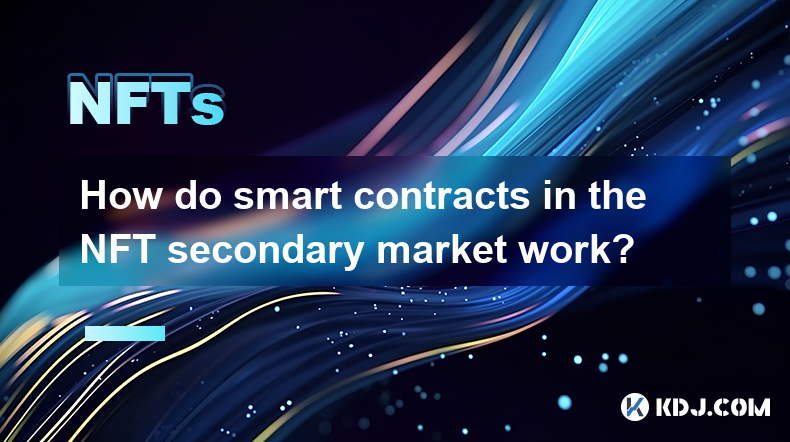
How do smart contracts in the NFT secondary market work?
Apr 03,2025 at 07:14am
Smart contracts play a pivotal role in the NFT secondary market, facilitating seamless transactions and enforcing predefined rules. These self-executing contracts with the terms of the agreement directly written into code are stored on the blockchain. In the context of NFTs, smart contracts automate the buying, selling, and transferring of digital asset...
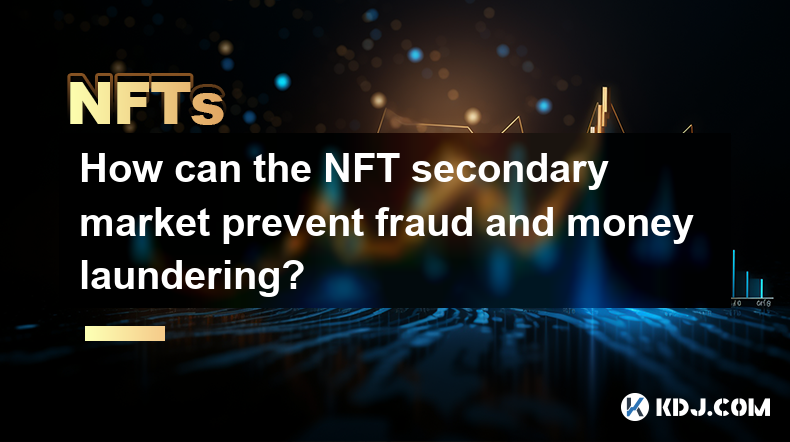
How can the NFT secondary market prevent fraud and money laundering?
Apr 03,2025 at 08:35am
The NFT secondary market has become a thriving hub for digital art and collectibles, but it also faces challenges in preventing fraud and money laundering. To tackle these issues, the market can implement various strategies and technologies to ensure a safer and more transparent trading environment. This article will explore how the NFT secondary market...
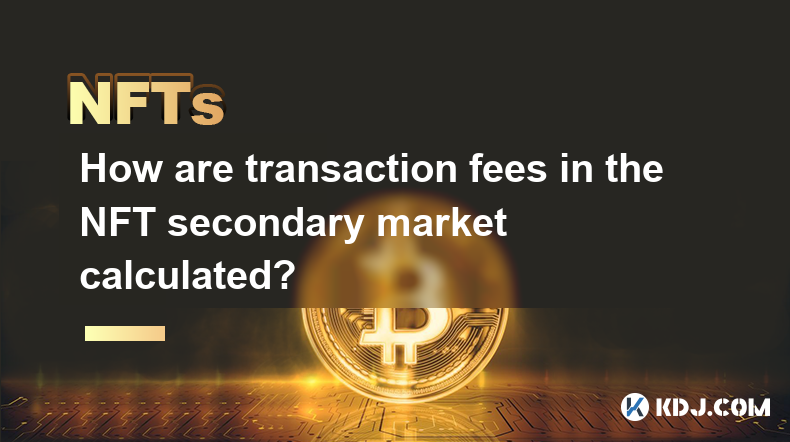
How are transaction fees in the NFT secondary market calculated?
Apr 04,2025 at 05:28am
The calculation of transaction fees in the NFT secondary market is a crucial aspect that both buyers and sellers need to understand. These fees can significantly impact the overall cost of transactions and the profits that sellers can make. In this article, we will delve into the various components that make up these fees, how they are calculated, and w...
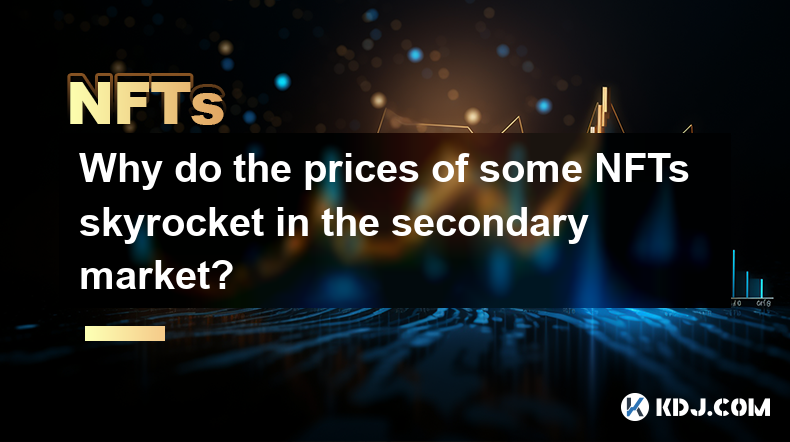
Why do the prices of some NFTs skyrocket in the secondary market?
Apr 06,2025 at 07:08am
The phenomenon of NFT prices skyrocketing in the secondary market is a fascinating aspect of the cryptocurrency and digital art world. Non-Fungible Tokens (NFTs) have taken the digital world by storm, and their value can surge dramatically after initial sales. Several factors contribute to this price surge, including rarity, demand, speculation, and the...
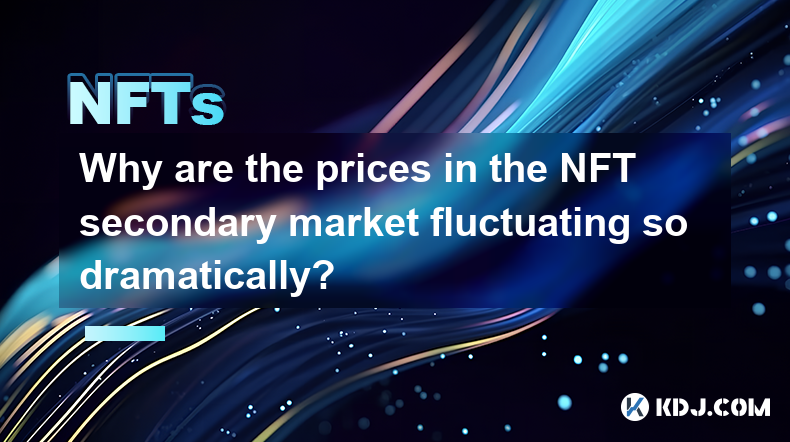
Why are the prices in the NFT secondary market fluctuating so dramatically?
Apr 03,2025 at 10:35pm
The NFT secondary market has been experiencing dramatic price fluctuations, leaving many in the cryptocurrency community puzzled and curious. To understand this phenomenon, it's essential to delve into the factors driving these price movements. From the impact of market sentiment and celebrity endorsements to the role of speculation and the unique natur...
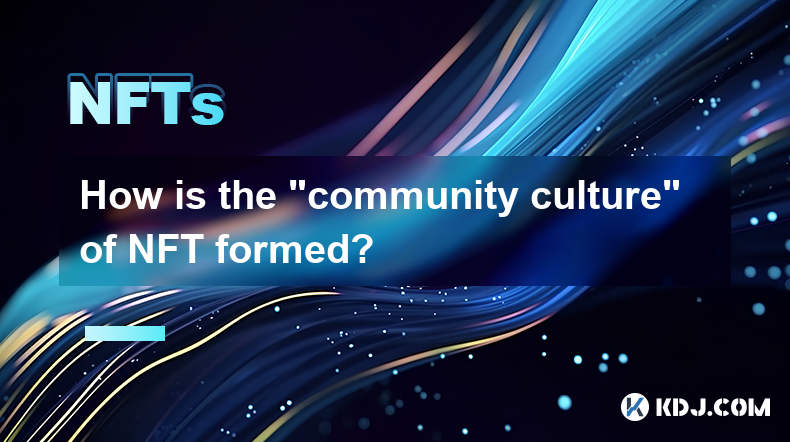
How is the “community culture” of NFT formed?
Apr 03,2025 at 11:07am
The formation of the 'community culture' within the NFT (Non-Fungible Token) space is a fascinating and multi-faceted process. It involves various elements such as shared interests, active engagement, and the creation of a sense of belonging among members. NFT communities often revolve around specific projects or artists, fostering a unique environment ...

How do smart contracts in the NFT secondary market work?
Apr 03,2025 at 07:14am
Smart contracts play a pivotal role in the NFT secondary market, facilitating seamless transactions and enforcing predefined rules. These self-executing contracts with the terms of the agreement directly written into code are stored on the blockchain. In the context of NFTs, smart contracts automate the buying, selling, and transferring of digital asset...

How can the NFT secondary market prevent fraud and money laundering?
Apr 03,2025 at 08:35am
The NFT secondary market has become a thriving hub for digital art and collectibles, but it also faces challenges in preventing fraud and money laundering. To tackle these issues, the market can implement various strategies and technologies to ensure a safer and more transparent trading environment. This article will explore how the NFT secondary market...

How are transaction fees in the NFT secondary market calculated?
Apr 04,2025 at 05:28am
The calculation of transaction fees in the NFT secondary market is a crucial aspect that both buyers and sellers need to understand. These fees can significantly impact the overall cost of transactions and the profits that sellers can make. In this article, we will delve into the various components that make up these fees, how they are calculated, and w...

Why do the prices of some NFTs skyrocket in the secondary market?
Apr 06,2025 at 07:08am
The phenomenon of NFT prices skyrocketing in the secondary market is a fascinating aspect of the cryptocurrency and digital art world. Non-Fungible Tokens (NFTs) have taken the digital world by storm, and their value can surge dramatically after initial sales. Several factors contribute to this price surge, including rarity, demand, speculation, and the...

Why are the prices in the NFT secondary market fluctuating so dramatically?
Apr 03,2025 at 10:35pm
The NFT secondary market has been experiencing dramatic price fluctuations, leaving many in the cryptocurrency community puzzled and curious. To understand this phenomenon, it's essential to delve into the factors driving these price movements. From the impact of market sentiment and celebrity endorsements to the role of speculation and the unique natur...

How is the “community culture” of NFT formed?
Apr 03,2025 at 11:07am
The formation of the 'community culture' within the NFT (Non-Fungible Token) space is a fascinating and multi-faceted process. It involves various elements such as shared interests, active engagement, and the creation of a sense of belonging among members. NFT communities often revolve around specific projects or artists, fostering a unique environment ...
See all articles





















































































